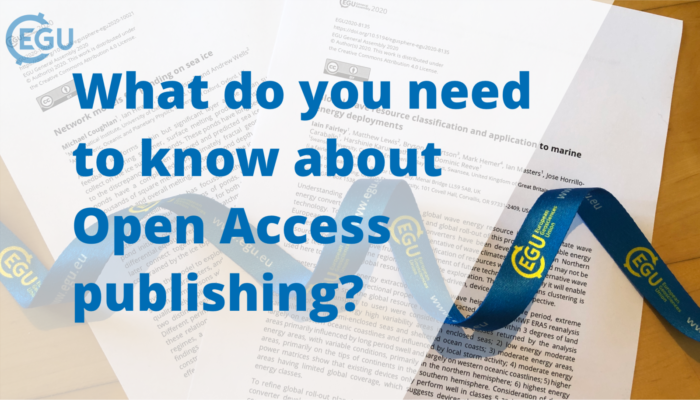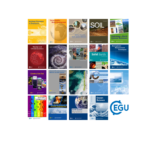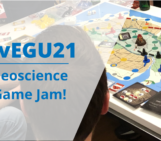
Earlier this week EGU’s Policy Officer, Chloe Hill was lucky enough to sit down with one of the many advocates for Open Access publishing on EGU’s Publications Committee: Ulrich Pöschl. Whilst all the members of our Publications Committee are fully committed to making EGU’s journals accessible and open, Ulrich has a unique perspective on this, as he is also the initiator and co-chair of the OA2020 initiative.
If you missed the webinar, you can watch the recording of it here:
As so much useful information was shared during the webinar, we thought we would highlight a few key questions and their answers here, in case anyone has concerns about submitting their paper Open Access, or about submitting their abstracts Open Access to our digital conference in the spring, vEGU21. As always if you have any additional questions you can contact us or our publishing partner Copernicus.org about vEGU21 or journal questions.
What is Open Access and Open Science?
Open Science is a term that refers to all sorts of ‘open’ approaches to a scientific enterprise, which includes the products of your research (like research papers), but also the raw data itself and any code or tools you use or develop. Therefore Open Access is a facet of an Open Science approach to doing research. Open Access, particularly when it comes to published research, was in fact one of the first ‘pillars’ of Open Science, and it specifically refers to ensuring the open ability to access and reuse published scientific research. Though some aspects of Open Science may feel difficult for researchers to do (particularly Open Data), Open Access is fairly straightforward and something we should all strike to achieve, it is even in the root of the Latin word for ‘publications’; these documents are supposed to be open to the public! EGU is a big supporter of this and has been publishing Open Access research since 2000.
What’s a DOI, and why is it important for Open Access publishing?
A DOI is a Digital Object Identifier, and is currently the most common way to uniquely identify objects on the internet, and it can be used to keep track of different versions of your research, and make sure that it is attributed to you. In fact there are other naming strategies and conventions that can be used, but it is currently the most widespread approach. Each DOI is unique and usually includes metadata, such as publication date, which helps keep track of your research.
Is there a risk to publishing Open Access, or following the principles of Open Science and publishing or sharing data before it has been fully peer reviewed?
There is always a risk in any kind of scientific publication or communication that people might not give you the full credit for your work. With Open Access, when we are referring specifically to sharing published materials, there is actually no additional risk at all. When it comes to sharing your data before it has been peer-reviewed there is a risk that if you are slower to publish peer-reviewed research then someone else may publish before you. However, anything that you share in a permanent way (as Open Science materials are supposed to be) acts as a publication, which is public evidence that protects your ownership of these ideas. Although conference materials are not peer-reviewed, or are light peer-reviewed, they still act as a publication (of sorts) of your work – though this does not replace peer-reviewed publications. So basically, the risk is actually pretty low, and the real advantages outweigh the potential disadvantages of sharing your research openly.
What advice would you offer to someone who is interested in submitting an abstract to vEGU21 Open Access, maybe for the first time?
Go for it! Submitting an abstract to present your work at the virtual General Assembly vEGU21 will give you the ability to engage with public commenting on your open resource materials and get immediate feedback and recognition of your work. In our experience Early Career Scientists in particular enjoy this kind of engagement, so you shouldn’t be afraid to discuss your work, even at early stages, in this open and supportive environment. If you have any questions about the process, email egu21@copernicus.org.
How has Open Access and Open Science landscape has changed in Europe over the last few years?
Open Access science, much like EGU itself, is a bottom up idea that was started by scientists themselves, and was afterwards adopted by several science institutions, leading to the signing of the Berlin Declaration (of which EGU was one of the first learned societies to sign). Since then change has been moving pretty slowly, as it is still mostly driven by scientists themselves, and the focus has been on bringing scientists into an Open Access way of publishing for example with OA2020. However, with growing support from the European Commission and Science Europe, along with practices such as Plan S these top down initiatives including funders, publishers and institutions is helping to work with the bottom up approach to clarify the importance of Open Access to European research. In fact now, some European countries have converted up to 60% of their whole research output into Open Access, which is a huge step forward. The benefits of Open Access publishing are undeniable, so we are hoping to see this continue to increase over the next few years.
Thank you so much to Ulrich Pöschl for his great interview – check the link above for the full video. Don’t forget to submit your abstracts to vEGU21 by 13.00 CET Wednesday 13 January 2021! We look forward to seeing you online between the 19 and 30 April 2021!



